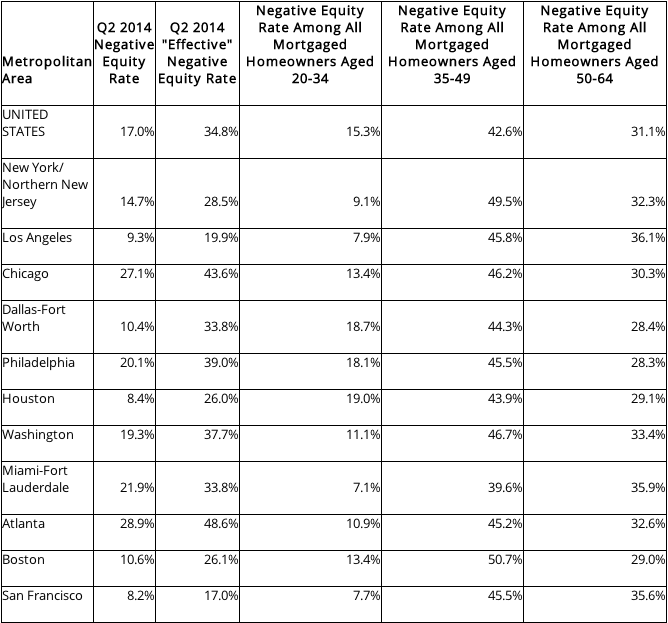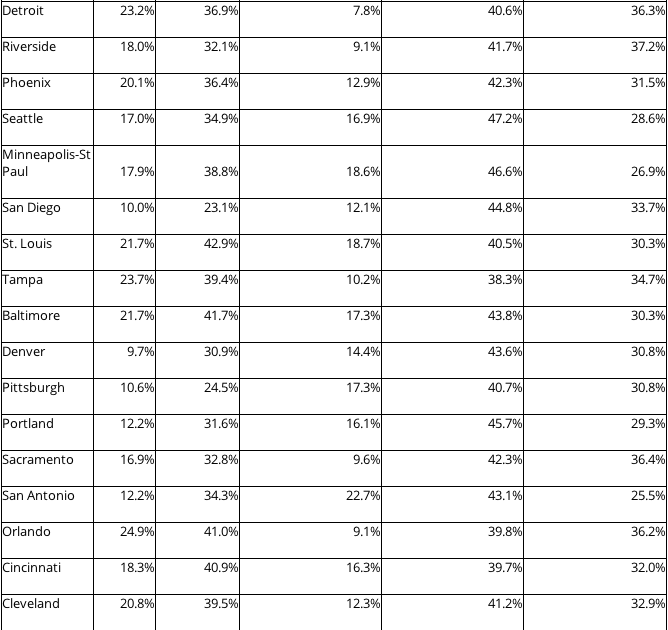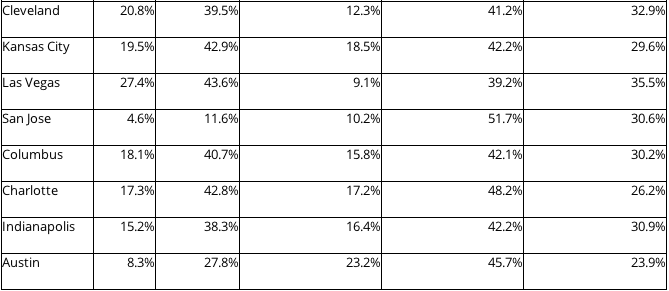You are viewing our site as a Broker, Switch Your View:
Agent | Broker Reset Filters to Default Back to ListHigh Negative Equity Among Gen X Homeowners Causing Housing Market Gridlock
August 26 2014
SEATTLE, August 26, 2014 -- Generation X homeowners are far more likely to be underwater on their mortgage than millennial and Baby Boomer homeowners, a generational block that could limit the market for years, according to the second quarter Zillow® Negative Equity Report. The overall national negative equity rate fell to 17 percent in the second quarter, with more than 8.7 million homeowners with a mortgage owing more than their home was worth.
Approximately 42.6 percent of Generation X homeowners (those aged from 35 to 49) are underwater on their mortgage, compared to 15.3 percent of millennial homeowners (20-34 years old) and 31.1 percent of Baby Boomers (50-64 years old). Because it is very difficult for an underwater homeowner to list their home for sale, the wide disparities among generations stand to have ripple effects throughout the housing market. Baby Boomers may not be able to find move-up buyers for their homes as Gen X remains stuck, and millennials can't move into the more affordable starter homes currently occupied by Gen X.
In general, the least expensive homes most likely to be sought by millennial and first-time buyers are more likely to be underwater than middle and top-tier homes. Among all homes with a mortgage nationwide, 28.2 percent valued within the bottom third of home values were underwater in the second quarter, compared to 15.8 percent of homes in the middle tier and 9.2 percent in the top tierii. Nationwide, more than one-third of homeowners with a mortgage (34.8 percent) are effectively underwater, unable to sell their homes for enough profit to comfortably meet expenses related to selling a home and afford a down payment on a new one.
"On the surface, the housing recession did not overtly impact millennials' housing wealth to the degree it did Generation X and the Baby Boomers, as most millennials were likely too young to have purchased a home during the bubble years," said Zillow Chief Economist Dr. Stan Humphries. "But as this huge generation begins to consider buying homes, they're entering a market still very much in recovery and far from anyone's definition of normal. Because so many homes are stuck in negative equity or are effectively underwater, the inventory of homes for sale is severely constrained, leading to more competition for those that are available. And millennials likely don't have the resources to compete with cash offers or engage in bidding wars. The reality is, negative equity is part of the new normal, and finding creative solutions to keeping homes affordable, available and accessible to this generation will be critical going forward."
The national negative equity rate fell from 23.8 percent in the second quarter of last year and 18.8 percent in the first quarter. Negative equity will continue to recede as home values keep growing, though at a slower pace because the rate of home value growth is slowing and expected to continue to slow. Looking ahead, the national negative equity rate is expected to fall to 14.9 percent of all homeowners with a mortgage by the end of the second quarter of 2015, according to the Zillow Negative Equity Forecast.



About Zillow, Inc.
Zillow, Inc. (NASDAQ: Z) operates the largest home-related marketplaces on mobile and the Web, with a complementary portfolio of brands and products that help people find vital information about homes, and connect with the best local professionals. In addition, Zillow operates an industry-leading economics and analytics bureau led by Zillow's Chief Economist Dr. Stan Humphries. Dr. Humphries and his team of economists and data analysts produce extensive housing data and research covering more than 450 markets at Zillow Real Estate Research. Zillow also sponsors the quarterly Zillow Home Price Expectations Survey, which asks more than 100 leading economists, real estate experts and investment and market strategists to predict the path of the Zillow Home Value Index over the next five years. Zillow also sponsors the bi-annual Zillow Housing Confidence Index (ZHCI) which measures consumer confidence in local housing markets, both currently and over time. The Zillow, Inc. portfolio includes Zillow.com®, Zillow Mobile, Zillow Mortgage , Zillow Rentals, Zillow Digs®, Postlets®, Diverse Solutions®, Agentfolio®, Mortech®, HotPads™, StreetEasy® and Retsly™. The company is headquartered in Seattle.









